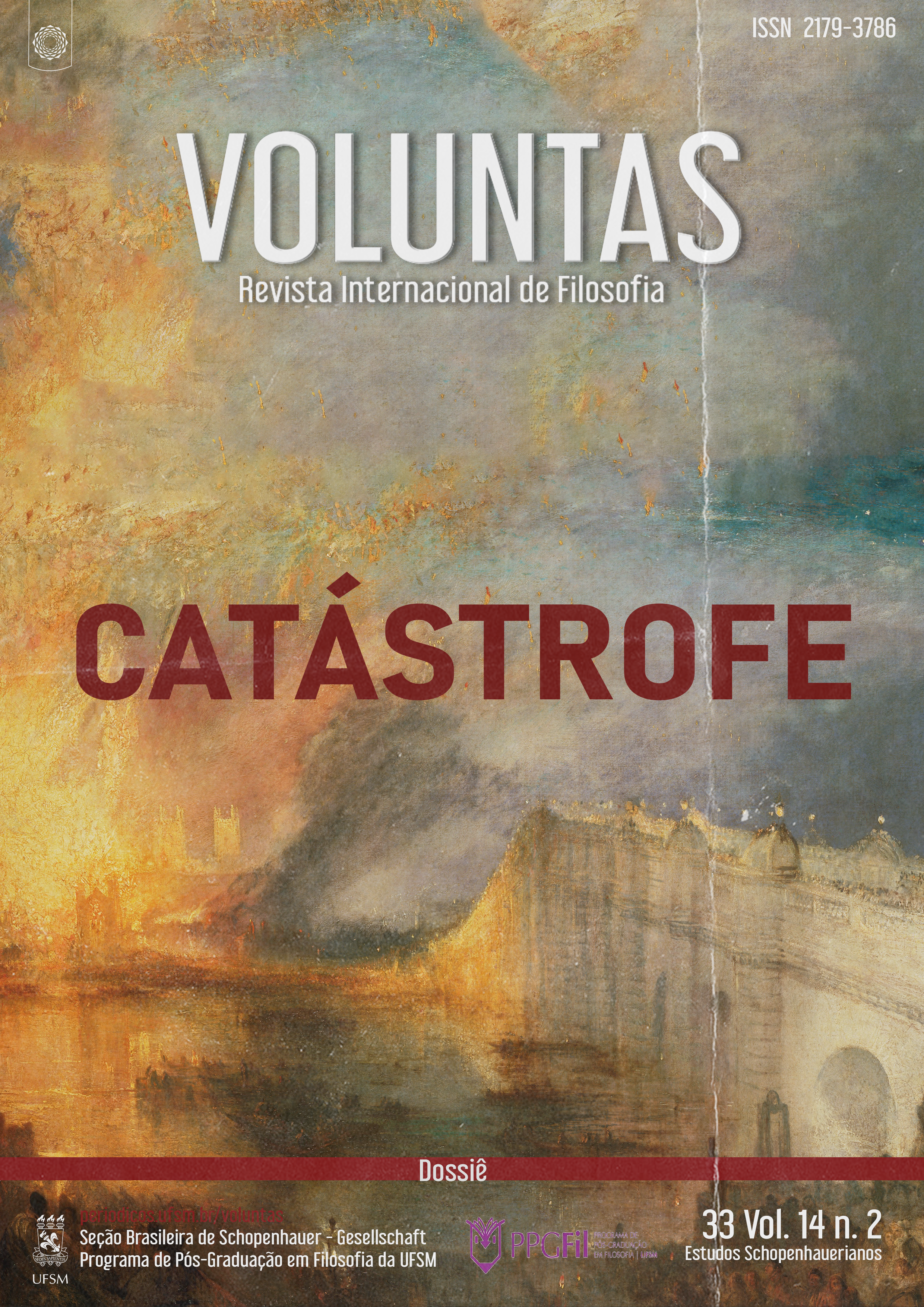The Anthropocene and the contribution of Schopenhauerian Eudemonology to thinking about the environmental crisis
DOI:
https://doi.org/10.5902/2179378685340Keywords:
Eudemonology, Anthropocene , SchopenhauerAbstract
The idea of a new geological period expressed by the Anthropocene concept gives us the dimension of the human impact on Earth. We, contemporary humans, are a geological force, or rather, our mode of existence has become that force. UN Climate Panel reports, climatological data, projections, among other scientific sources, have become objects of interest for philosophical reflection on the future of a planet heavily impacted by the excesses of technological civilization. This situation imposes on contemporary philosophy the challenge not only of facing the problem, but also of thinking about other possibilities of existence that strengthen the bond with the Earth. In this sense, this article aims to present in general lines the discussion about the idea of Anthropocene and a Schopenhauerian eudemonological proposal based on the update of Schopenhauer's thought, so that we can think about the catastrophic scenario that is taking shape with the realization of the severity of our time.
Downloads
References
BARBOZA, Jair. Sabedoria de vida e práxis em Schopenhauer ou sobre uma possível “esquerda” schopenhaueriana. In: Filosofia alemã de Kant a Hegel (Organização de Marcelo Carvalho e Vinicius Figueiredo). São Paulo: ANPOF, pp.263- 272.
BARBOZA, Jair. A redescobeta da natureza nas filosofias de Schelling e Schopenhauer como reação ao acosmismo de Fichte. In. Nietzsche- Schopenhauer: Ecologia Cinza, natureza agônica/ Ruy de Carvalho, Gustavo Costa, Thiago Mota, (Orgs). Fortaleza: EdUECE, 2013.
CHAKRABARTY, D. “The Climate of History: Four Theses”. In: Critical Inquiry, vol. 35, no. 2, 2009, p. 197-222. DOI: https://doi.org/10.1086/596640
CHEVITARESE, Leandro. A eudemonologia empírica de Schopenhauer: a liberdade que nos resta para a prática de vida. In: REDYSON, Deyve (org.). Arthur Schopenhauer no Brasil: em memória dos 150 anos da morte de Schopenhauer. João Pessoa: Ideia, 2010.
CHEVITARESE, Leandro. Considerações sobre a Atualidade de Schopenhauer. SOFIA (ISSN 2317-2339), Vitória, V.7, N.2, P. 43-58, JUL./DEZ. 2018. DOI: https://doi.org/10.47456/sofia.v7i2.20883
CHEVITARESE, Leandro. Schopenhauer e a ética ambiental. In: Nietzsche-Schopenhauer: ecologia cinza, natureza agônica/Ruy de Carvalho, Gustavo Costa, Thiago Mota (Orgs.). Fortaleza: EdUECE, 2013.
DANOWSKI, Deborah. VIVEIROS DE CASTRO, Eduardo. Há Mundos Porvir? Ensaio sobre o medo e os fins. São Paulo: ISA/Cultura e Barbárie, 2014.
DEBONA, Vilmar. A outra face do pessimismo: entre radicalidade ascética e sabedoria de vida. Tese de Doutorado. São Paulo: Universidade de São Paulo, 2013.
DURANTE, F. Direito Natural e Direitos Fundamentais: A atualidade de Schopenhauer para o debate acerca dos Direitos Humanos. 2017. Departamento de Filosofia. Tese de Doutorado. UNICAMP, 2017.
HARAWAY, Donna. Staying with the Trouble: Making Kin in the Chthulucene. London: Duke University Press, 2016. DOI: https://doi.org/10.2307/j.ctv11cw25q
HARAWAY, Donna. Antropoceno, Capitaloceno, Plantationoceno, Chthuluceno: fazendo parentes. ClimaCom Cultura Científica Ano 3, N. 5, Abril de 2016, p. 139-146.
HORKHEIMER, M. Schopenhauer und die Gesellschaft. In: Jahburch der Schopenhauergesellschaft für das Jahr, 1955, Band 36. Frankfurt am Main: Waldemar Kramer, 1955. A atualidade de Schopenhauer. Tradução Lucas Lazarini Valente. Voluntas: Revista Internacional de Filosofia - periodicos.ufsm.br/voluntas - Santa Maria - Vol. 9, n. 2, jul.-dez. 2018, p. 190-208. DOI: https://doi.org/10.5902/2179378636126
HORKHEIMER, M. Schopenhauer e a Sociedade. Tradução Thiago Souza Salvio. Voluntas: Revista Internacional de Filosofia - periodicos.ufsm.br/voluntas - Santa Maria - Vol. 9, n. 2, jul.-dez. 2018, p. 180-189. DOI: https://doi.org/10.5902/2179378633657
HORKHEIMER, M Die Aktualität Schopenhauers. In: Jahburch der Schopenhauergesellschaft für das Jahr, 1961, Band 42. Frankfurt am Main: Waldemar Kramer, p.12-25, 1961.
HORKHEIMER, M. La actualidad de Schopenhauer. In: HORKHEIMER, Max; ADORNO, Theodor. Sociologica. Trad. Victor Sánchez de Zavala. Madrid: Taurus, 1966a.
HORKHEIMER, M. Schopenhauer y la sociedad. In: HORKHEIMER, Max; ADORNO, Theodor. Sociologica. Trad. Victor Sánchez de Zavala. Madrid: Taurus, 1966b.
LÜTKEHAUS, L. Schopenhauer Metaphysischer Pessimismus und soziale Frage. Bonn: Bouvier, 1980.
LÜTKEHAUS, L. Esiste una sinistra schopenhaueriana? Ovvero: il pessimismo è un quietismo? In: CIRACÌ, Fabio; FAZIO, Domenico M.; PEDROCCHI, Francesca (Orgs.). Arthur Schopenhauer e la sua scuola. Lecce: Pensa Multimedia, 2007. p. 15-34.
MARTINS, Iasmim. A Natureza como parte da essência íntima do mundo: A questão ambiental na filosofia de Schopenhauer. Rio de Janeiro, PUC-Rio, 2020.
MOORE, Jason. Anthropocene or Capitalocene? Nature, History, and the Crisis of Capitalism. Oakland: PM Press, 2016.
SAFRANSKI, R. Schopenhauer e os anos mais selvagens da filosofia: uma biografia. Tradução Willian Lagos. São Paulo: Geração Editorial, 2011.
SCHOPENHAUER, Arthur. Aforismos para a sabedoria de vida. Trad. Jair Barboza. São Paulo: Martins Fontes, 2009.
SCHOPENHAUER, Arthur. O Mundo como Vontade e como Representação. Trad. Jair Barboza. São Paulo: Editora UNESP, 2005.
SCHOPENHAUER, Arthur.Parerga e Paralipomena. Trad. M. L. M. O. Cacciola. SP: Nova Cultural. 1988. (Col. Os Pensadores).
SCHOPENHAUER, Arthur.Sobre a Vontade na Natureza. Tradução, prefácio e notas Gabriel Valladão Silva. Porto Alegre: L&PM POCKET, 2013.
SCHOPENHAUER, Arthur. Sobre o fundamento da moral. Trad. Maria Lúcia Cacciola. São Paulo: Martins Fontes, 1995.
VIESENTEINER, J. “Prudentia” e o uso prático da razão em Schopenhauer. In: Revista Voluntas: Estudos sobre Schopenhauer - Vol. 3, Números 1 e 2 - 1º e 2º semestres de 2012, pp. 3-19. DOI: https://doi.org/10.5902/2179378633986
Published
How to Cite
Issue
Section
License
Copyright (c) 2024 Iasmim Martins Souto, Michelle Bobsin

This work is licensed under a Creative Commons Attribution-NonCommercial-ShareAlike 4.0 International License.
The submission of original manuscripts to this journal implies the transference, by the authors, of the copyrights for printed and digital publication. The copyrights of a published manuscript belong ultimately to the author, and only the copyright for its first publication is reserved to the journal. Authors may only use the same results in other publications explicitly indicating this journal as the medium of the original publication.
Licence
Attribution-NonCommercial-ShareAlike 4.0 International (CC BY-NC-SA 4.0) - This license lets others remix, tweak, and build upon your work non-commercially, as long as they credit you and license their new creations under the identical terms.






